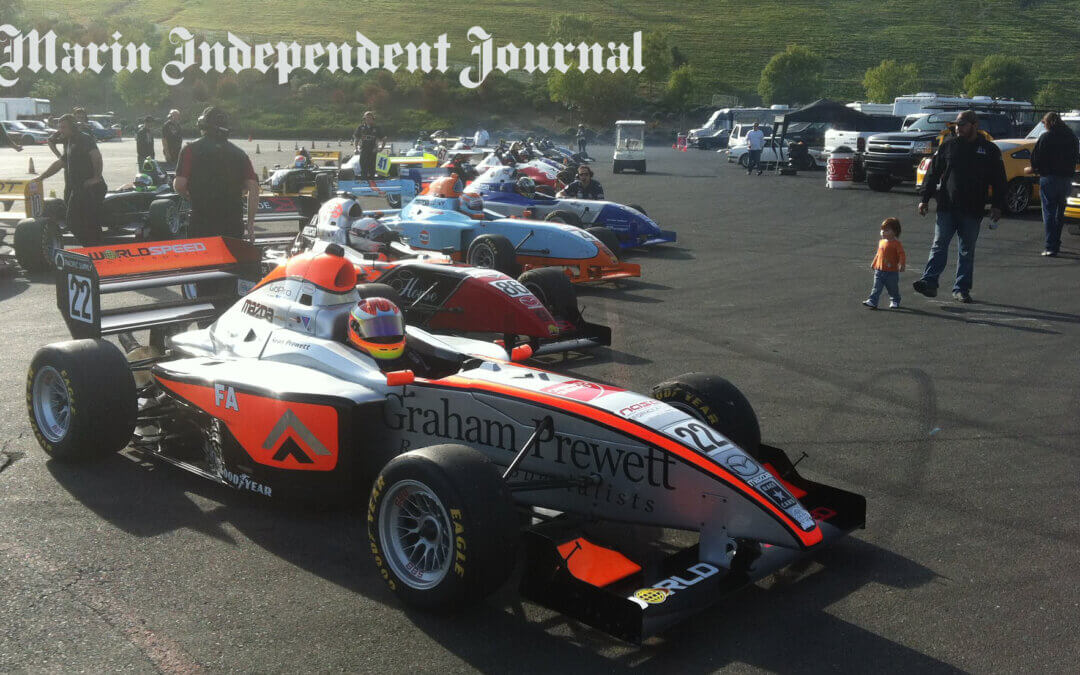![]() Marin Motor Sports: Novato’s Stewart helps to design an affordable way to get into racing
Marin Motor Sports: Novato’s Stewart helps to design an affordable way to get into racing
By Todd Telford
IJ correspondent
IN JUST LONGER than 15 years, Novato’s Telo Stewart has gone from teenage mechanic-in-training to a major player within America’s formula car ranks. Now president of World Speed Motorsports, Stewart is in charge of running and preparing a fleet of race cars, overseeing the Formula Car Challenge racing series, and building a new class of formula car from scratch, the Formula Speed 2.0.
It’s all part of extending the legacy and scope of World Speed which was founded in 1991, five years before Stewart came on board. For two decades the organization has had a hand in preparing and developing race cars — and the drivers behind their wheels.
“Chuck West, one of the founders of World Speed, was a great driver coach, and we’ve always prided ourselves on the driver development aspect of the team,” Stewart said from their race shops at Infineon Raceway.
The single-seater, mid-engined formula car platform provides an ideal training ground for those looking to learn the craft of racing. The cars are, by far, the most nimble and quick reacting of full-sized cars. Driving these cars is all about how you balance them in the corners, and in them you get an intuitive sense of weight transfer front to rear and side to side.
For drivers looking to move up from the karting ranks, smaller formula cars are the next step up towards a pro career. But for those well beyond their teens who don’t envision an Indy 500 in their future, World Speed can help them develop their craft.
“We support drivers of different demographics. We definitely support the younger aspiring professional drivers as well as the drivers who want a second career,” Stewart said. “They’ve had a successful career and are now in their middle age and are able to self-sponsor. In both cases I would consider us to be less of a prep shop and more of a team.”
World Speed runs its own car in Pro Formula Mazda. It preps a total of 27 cars that run in that series, the Formula Car Challenge, as well as in the Sports Car Club of America’s regional and national club racing events. Starting last year they began prepping Porsches for the IMSA GT3 Challenge spec series which runs as a support race on American Le Mans Series race weekends.
Stewart, a native of Colorado, started his career in the racing world by attending the year-long Jim Russell Racing School Mechanics Training Program in 1995 at Laguna Seca at age 18. He finished second in the MTP Driver Championship within the school and received the President’s Award for excellence in race car mechanics.
He returned to work at Colorado’s Second Creek Speedway, a member-supported road course, wrenching on Spec Racer Renaults before coming to work for World Speed in ’96. He both worked full time and raced for the team within the San Francisco Region of the SCCA.
After working his way up within the team, Stewart found an opportunity when West was looking towards retirement. The team sold off all their Formula Atlantic equipment and cars, and Stewart found a way to take over the Formula Mazda program in 2002 and retain the name which came to mean so much for drivers looking to find a way to go pro.
Among those that have taken the World Speed route on their way to the pros are current NASCAR drivers Michael McDowell, Brad Coleman and Andy Lally, driver for Novato resident Kevin Buckler’s Sprint Cup team. Other alumni include Alex Figge, recent IndyCar driver Mario Moraes and veteran international endurance racer Pierre Ehret.
With the new Formula Speed 2.0, Stewart and World Speed have produced a car that addresses two of the limitations formula cars are usually known for: the high cost of replacement bodywork and the narrowness of their cockpits. Using aluminum instead of carbon fiber for their wings front and rear reduces their replacement costs by 70 percent, and brings the sticker price below $70,000.
Behind the roomy super-sized cockpit is a 2.0-liter Mazda engine making 195 horsepower. The 1,050-pound car runs in the Formula Atlantic class in the SCCA and in its own class within the National Auto Sport Association, the sanctioning body for Stewart’s Formula Car Challenge series.
With all the demands and challenges from all the different hats he wears, Stewart loves what he’s doing. But beyond the mechanical focus, there’s a very human aspect to the team’s accomplishments.
“It’s definitely fun seeing drivers come through our team and our series and then move on and see them be successful,” he said.
In racing there are the gifted and the merely diligent, and Stewart gets just as much satisfaction from developing the latter. “It’s really fun working with drivers who maybe aren’t the best drivers, but if they are willing to work at it, listen to the feedback we give, we see them progress into really excellent race drivers,” Stewart said. “That’s a rare pleasure for sure.”
